Cultural Profile for Huawei's Expansion in Chile, Australia, and Norway
VerifiedAdded on 2023/06/07
|13
|2123
|180
AI Summary
This report analyses the cultural profile of five countries based on Hofstede's Model. It provides recommendations for Huawei's expansion in Chile, Australia, and Norway. The report suggests strategies for the company to establish in new markets by manufacturing products as per the culture and tradition of the country. It also recommends the company to take advantage of the similarities and differences between the cultures of the countries.
Contribute Materials
Your contribution can guide someone’s learning journey. Share your
documents today.
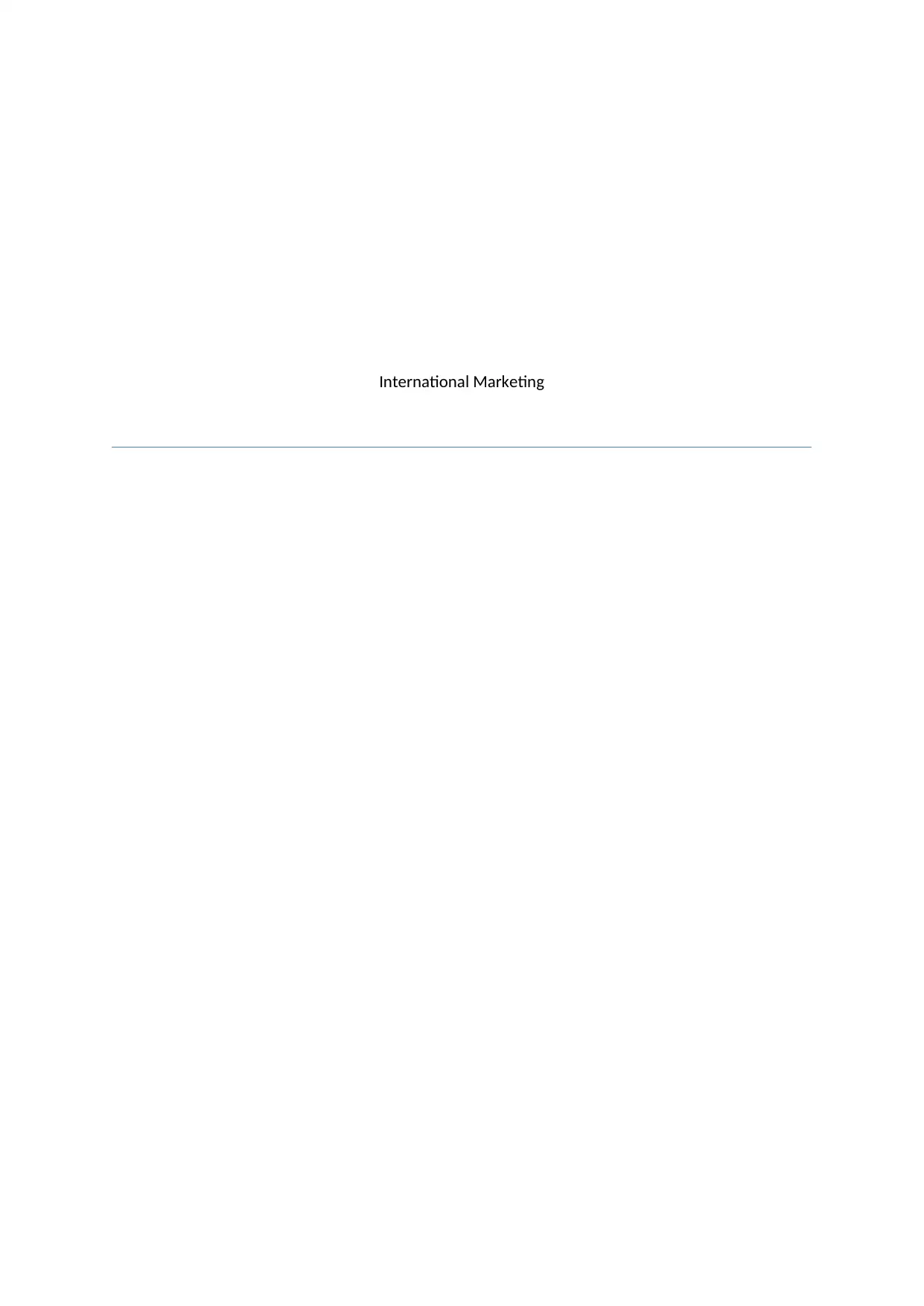
International Marketing
Secure Best Marks with AI Grader
Need help grading? Try our AI Grader for instant feedback on your assignments.
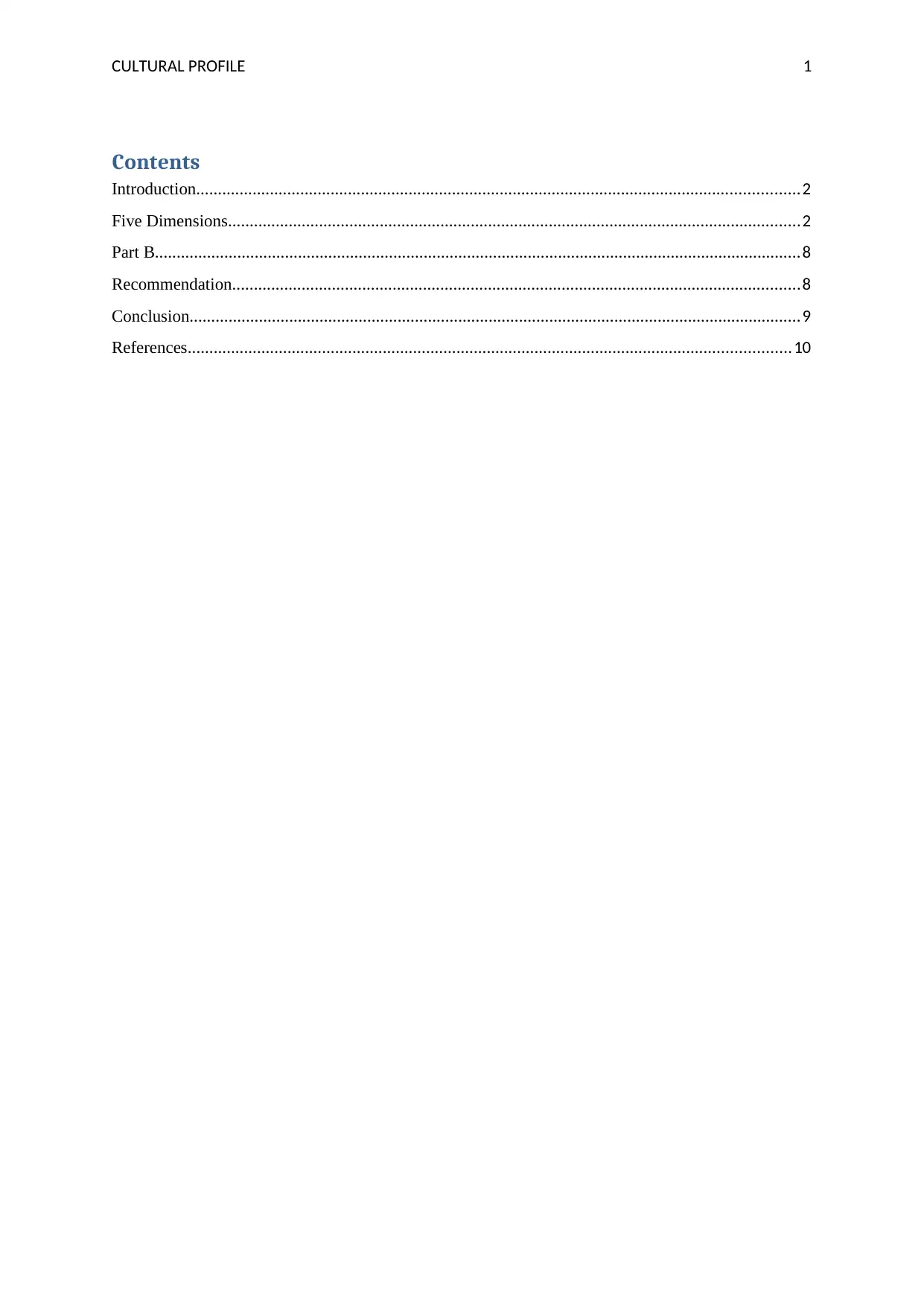
CULTURAL PROFILE 1
Contents
Introduction...........................................................................................................................................2
Five Dimensions....................................................................................................................................2
Part B.....................................................................................................................................................8
Recommendation...................................................................................................................................8
Conclusion.............................................................................................................................................9
References...........................................................................................................................................10
Contents
Introduction...........................................................................................................................................2
Five Dimensions....................................................................................................................................2
Part B.....................................................................................................................................................8
Recommendation...................................................................................................................................8
Conclusion.............................................................................................................................................9
References...........................................................................................................................................10
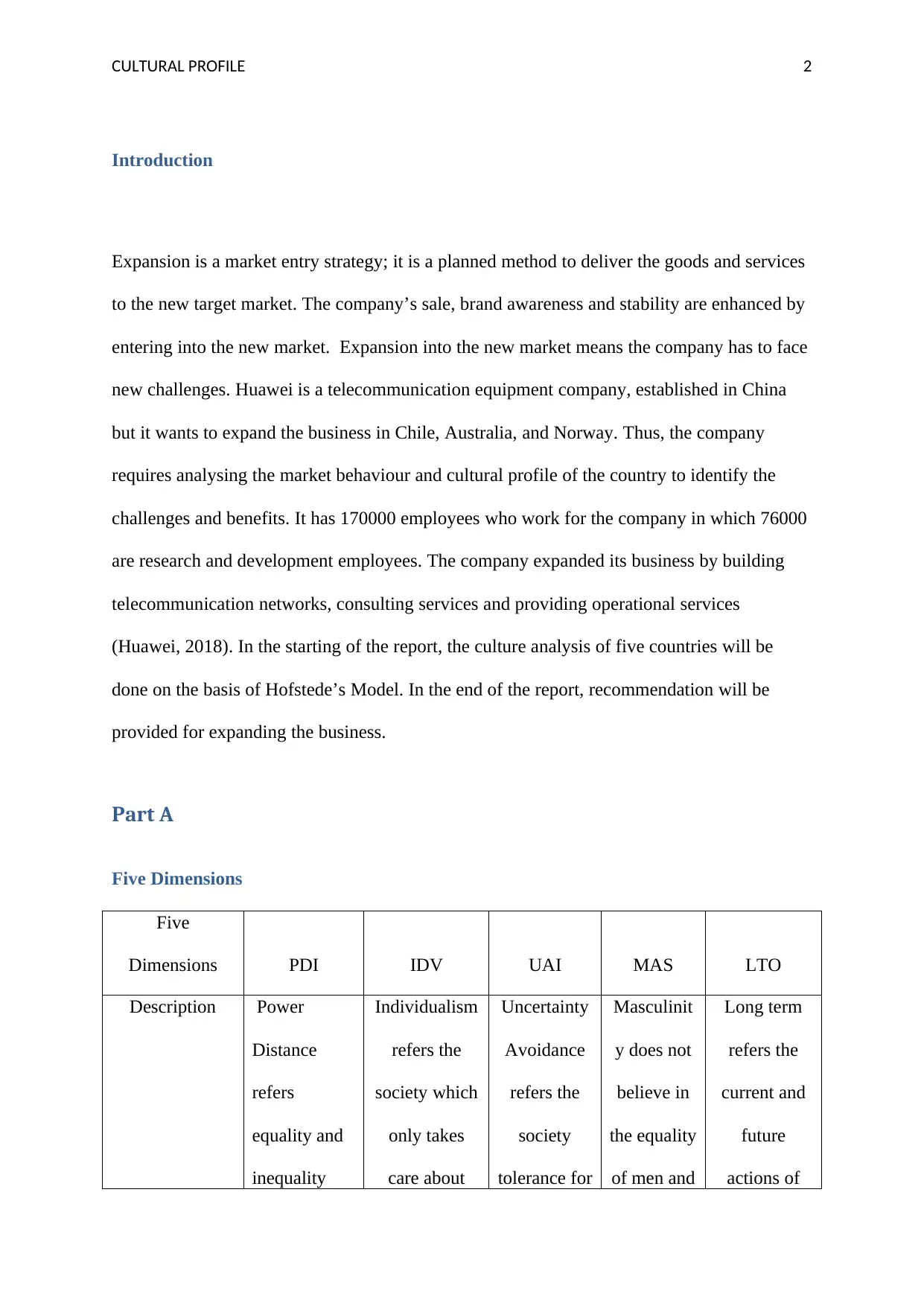
CULTURAL PROFILE 2
Introduction
Expansion is a market entry strategy; it is a planned method to deliver the goods and services
to the new target market. The company’s sale, brand awareness and stability are enhanced by
entering into the new market. Expansion into the new market means the company has to face
new challenges. Huawei is a telecommunication equipment company, established in China
but it wants to expand the business in Chile, Australia, and Norway. Thus, the company
requires analysing the market behaviour and cultural profile of the country to identify the
challenges and benefits. It has 170000 employees who work for the company in which 76000
are research and development employees. The company expanded its business by building
telecommunication networks, consulting services and providing operational services
(Huawei, 2018). In the starting of the report, the culture analysis of five countries will be
done on the basis of Hofstede’s Model. In the end of the report, recommendation will be
provided for expanding the business.
Part A
Five Dimensions
Five
Dimensions PDI IDV UAI MAS LTO
Description Power
Distance
refers
equality and
inequality
Individualism
refers the
society which
only takes
care about
Uncertainty
Avoidance
refers the
society
tolerance for
Masculinit
y does not
believe in
the equality
of men and
Long term
refers the
current and
future
actions of
Introduction
Expansion is a market entry strategy; it is a planned method to deliver the goods and services
to the new target market. The company’s sale, brand awareness and stability are enhanced by
entering into the new market. Expansion into the new market means the company has to face
new challenges. Huawei is a telecommunication equipment company, established in China
but it wants to expand the business in Chile, Australia, and Norway. Thus, the company
requires analysing the market behaviour and cultural profile of the country to identify the
challenges and benefits. It has 170000 employees who work for the company in which 76000
are research and development employees. The company expanded its business by building
telecommunication networks, consulting services and providing operational services
(Huawei, 2018). In the starting of the report, the culture analysis of five countries will be
done on the basis of Hofstede’s Model. In the end of the report, recommendation will be
provided for expanding the business.
Part A
Five Dimensions
Five
Dimensions PDI IDV UAI MAS LTO
Description Power
Distance
refers
equality and
inequality
Individualism
refers the
society which
only takes
care about
Uncertainty
Avoidance
refers the
society
tolerance for
Masculinit
y does not
believe in
the equality
of men and
Long term
refers the
current and
future
actions of
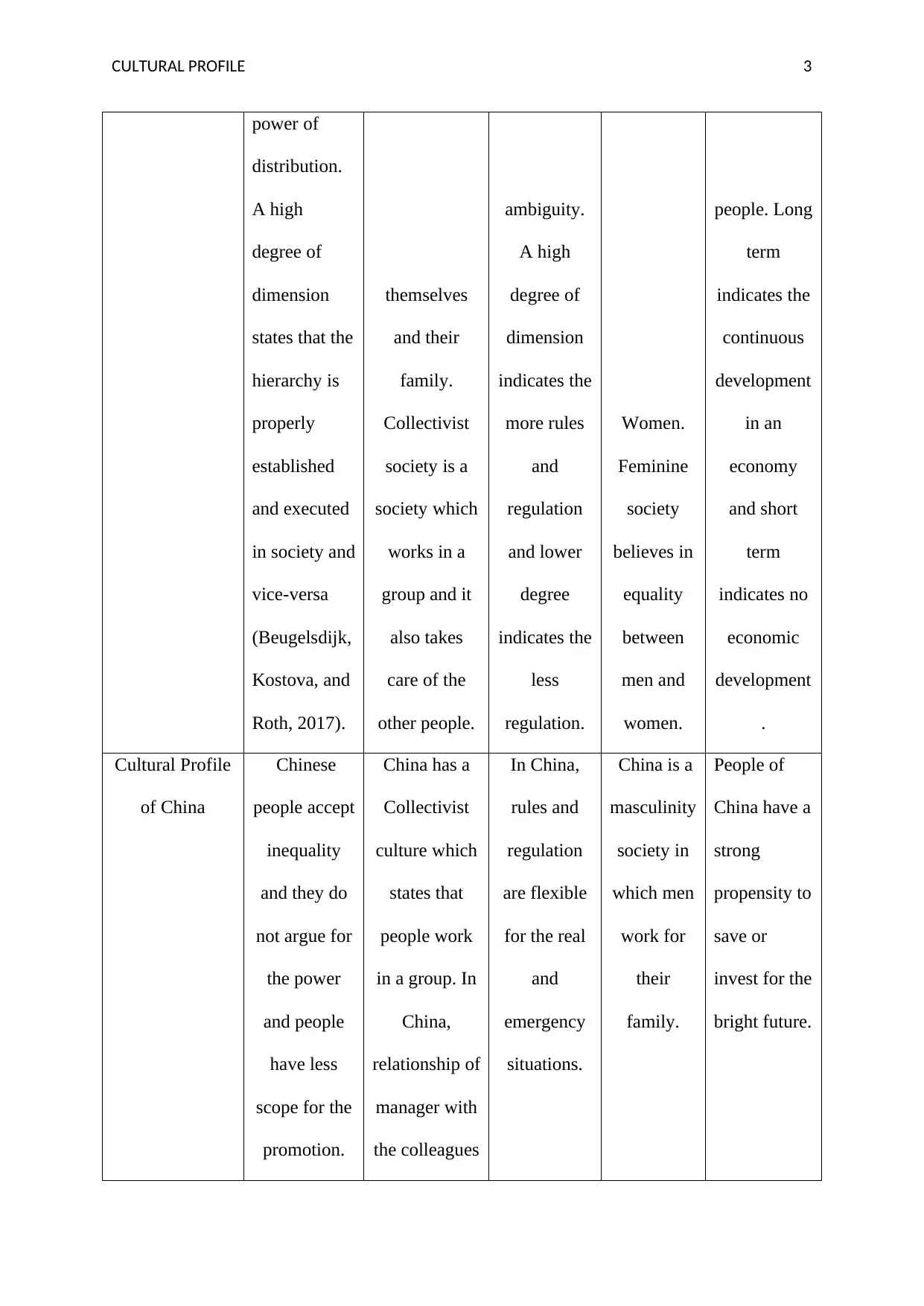
CULTURAL PROFILE 3
power of
distribution.
A high
degree of
dimension
states that the
hierarchy is
properly
established
and executed
in society and
vice-versa
(Beugelsdijk,
Kostova, and
Roth, 2017).
themselves
and their
family.
Collectivist
society is a
society which
works in a
group and it
also takes
care of the
other people.
ambiguity.
A high
degree of
dimension
indicates the
more rules
and
regulation
and lower
degree
indicates the
less
regulation.
Women.
Feminine
society
believes in
equality
between
men and
women.
people. Long
term
indicates the
continuous
development
in an
economy
and short
term
indicates no
economic
development
.
Cultural Profile
of China
Chinese
people accept
inequality
and they do
not argue for
the power
and people
have less
scope for the
promotion.
China has a
Collectivist
culture which
states that
people work
in a group. In
China,
relationship of
manager with
the colleagues
In China,
rules and
regulation
are flexible
for the real
and
emergency
situations.
China is a
masculinity
society in
which men
work for
their
family.
People of
China have a
strong
propensity to
save or
invest for the
bright future.
power of
distribution.
A high
degree of
dimension
states that the
hierarchy is
properly
established
and executed
in society and
vice-versa
(Beugelsdijk,
Kostova, and
Roth, 2017).
themselves
and their
family.
Collectivist
society is a
society which
works in a
group and it
also takes
care of the
other people.
ambiguity.
A high
degree of
dimension
indicates the
more rules
and
regulation
and lower
degree
indicates the
less
regulation.
Women.
Feminine
society
believes in
equality
between
men and
women.
people. Long
term
indicates the
continuous
development
in an
economy
and short
term
indicates no
economic
development
.
Cultural Profile
of China
Chinese
people accept
inequality
and they do
not argue for
the power
and people
have less
scope for the
promotion.
China has a
Collectivist
culture which
states that
people work
in a group. In
China,
relationship of
manager with
the colleagues
In China,
rules and
regulation
are flexible
for the real
and
emergency
situations.
China is a
masculinity
society in
which men
work for
their
family.
People of
China have a
strong
propensity to
save or
invest for the
bright future.
Secure Best Marks with AI Grader
Need help grading? Try our AI Grader for instant feedback on your assignments.
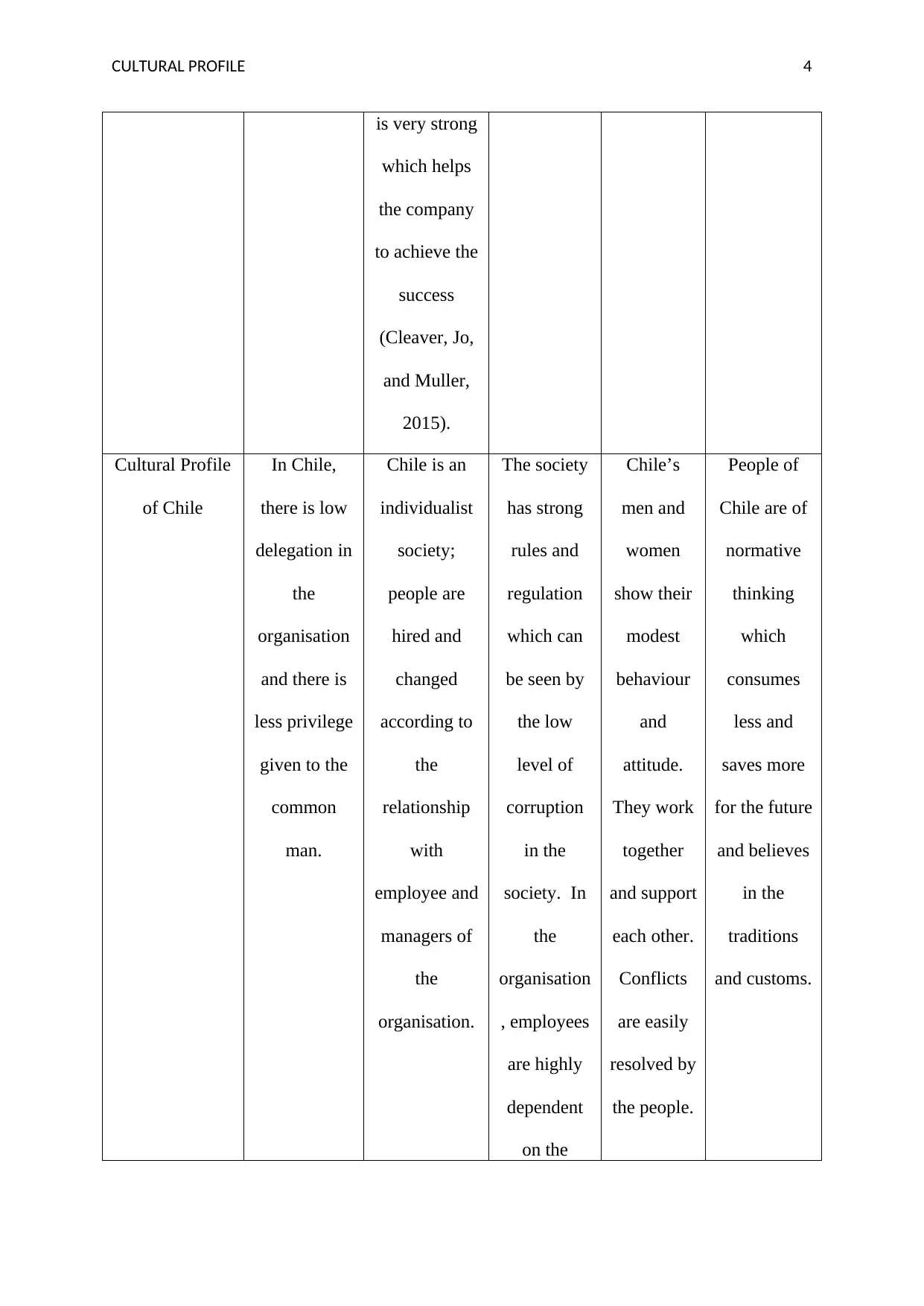
CULTURAL PROFILE 4
is very strong
which helps
the company
to achieve the
success
(Cleaver, Jo,
and Muller,
2015).
Cultural Profile
of Chile
In Chile,
there is low
delegation in
the
organisation
and there is
less privilege
given to the
common
man.
Chile is an
individualist
society;
people are
hired and
changed
according to
the
relationship
with
employee and
managers of
the
organisation.
The society
has strong
rules and
regulation
which can
be seen by
the low
level of
corruption
in the
society. In
the
organisation
, employees
are highly
dependent
on the
Chile’s
men and
women
show their
modest
behaviour
and
attitude.
They work
together
and support
each other.
Conflicts
are easily
resolved by
the people.
People of
Chile are of
normative
thinking
which
consumes
less and
saves more
for the future
and believes
in the
traditions
and customs.
is very strong
which helps
the company
to achieve the
success
(Cleaver, Jo,
and Muller,
2015).
Cultural Profile
of Chile
In Chile,
there is low
delegation in
the
organisation
and there is
less privilege
given to the
common
man.
Chile is an
individualist
society;
people are
hired and
changed
according to
the
relationship
with
employee and
managers of
the
organisation.
The society
has strong
rules and
regulation
which can
be seen by
the low
level of
corruption
in the
society. In
the
organisation
, employees
are highly
dependent
on the
Chile’s
men and
women
show their
modest
behaviour
and
attitude.
They work
together
and support
each other.
Conflicts
are easily
resolved by
the people.
People of
Chile are of
normative
thinking
which
consumes
less and
saves more
for the future
and believes
in the
traditions
and customs.
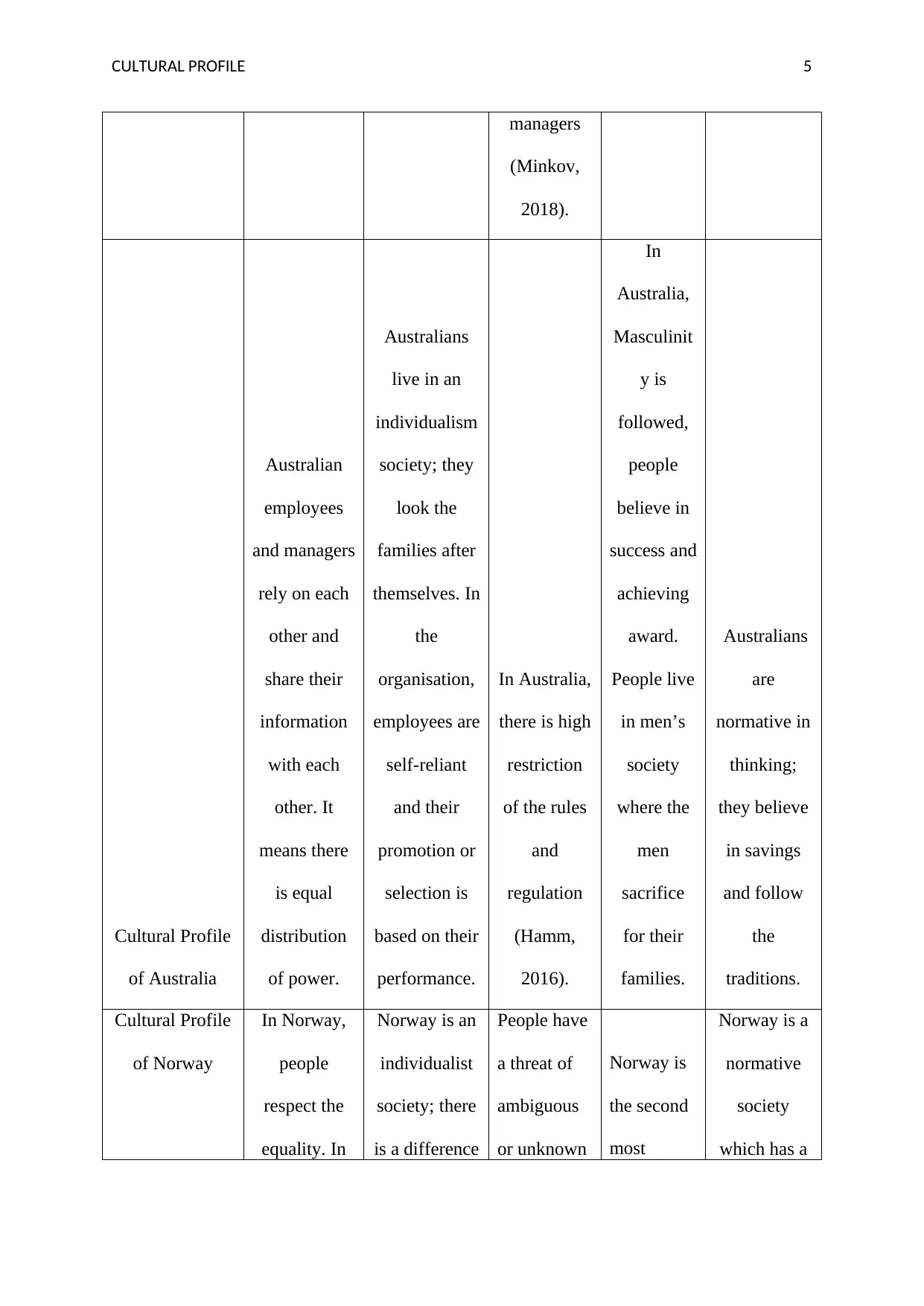
CULTURAL PROFILE 5
managers
(Minkov,
2018).
Cultural Profile
of Australia
Australian
employees
and managers
rely on each
other and
share their
information
with each
other. It
means there
is equal
distribution
of power.
Australians
live in an
individualism
society; they
look the
families after
themselves. In
the
organisation,
employees are
self-reliant
and their
promotion or
selection is
based on their
performance.
In Australia,
there is high
restriction
of the rules
and
regulation
(Hamm,
2016).
In
Australia,
Masculinit
y is
followed,
people
believe in
success and
achieving
award.
People live
in men’s
society
where the
men
sacrifice
for their
families.
Australians
are
normative in
thinking;
they believe
in savings
and follow
the
traditions.
Cultural Profile
of Norway
In Norway,
people
respect the
equality. In
Norway is an
individualist
society; there
is a difference
People have
a threat of
ambiguous
or unknown
Norway is
the second
most
Norway is a
normative
society
which has a
managers
(Minkov,
2018).
Cultural Profile
of Australia
Australian
employees
and managers
rely on each
other and
share their
information
with each
other. It
means there
is equal
distribution
of power.
Australians
live in an
individualism
society; they
look the
families after
themselves. In
the
organisation,
employees are
self-reliant
and their
promotion or
selection is
based on their
performance.
In Australia,
there is high
restriction
of the rules
and
regulation
(Hamm,
2016).
In
Australia,
Masculinit
y is
followed,
people
believe in
success and
achieving
award.
People live
in men’s
society
where the
men
sacrifice
for their
families.
Australians
are
normative in
thinking;
they believe
in savings
and follow
the
traditions.
Cultural Profile
of Norway
In Norway,
people
respect the
equality. In
Norway is an
individualist
society; there
is a difference
People have
a threat of
ambiguous
or unknown
Norway is
the second
most
Norway is a
normative
society
which has a
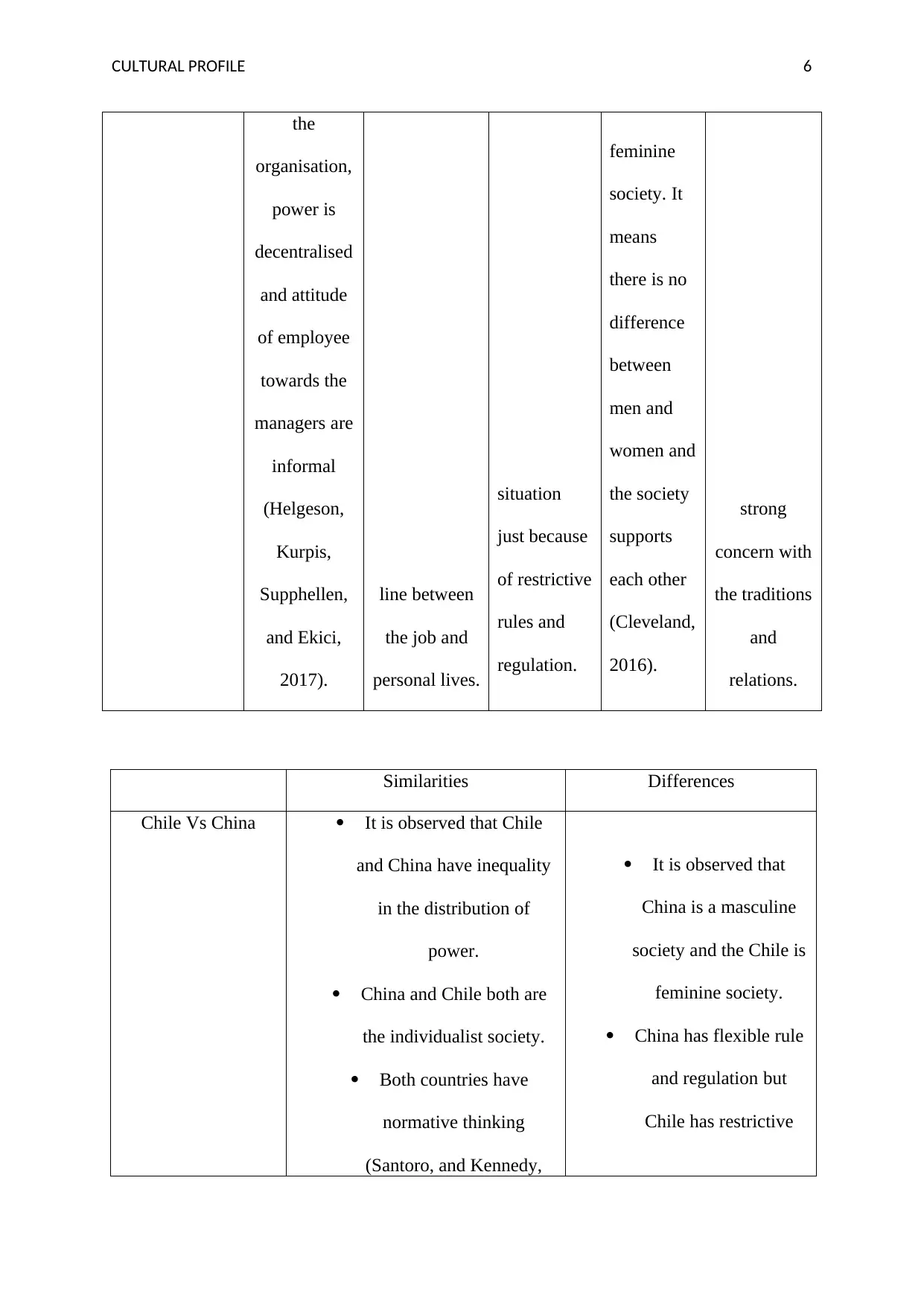
CULTURAL PROFILE 6
the
organisation,
power is
decentralised
and attitude
of employee
towards the
managers are
informal
(Helgeson,
Kurpis,
Supphellen,
and Ekici,
2017).
line between
the job and
personal lives.
situation
just because
of restrictive
rules and
regulation.
feminine
society. It
means
there is no
difference
between
men and
women and
the society
supports
each other
(Cleveland,
2016).
strong
concern with
the traditions
and
relations.
Similarities Differences
Chile Vs China It is observed that Chile
and China have inequality
in the distribution of
power.
China and Chile both are
the individualist society.
Both countries have
normative thinking
(Santoro, and Kennedy,
It is observed that
China is a masculine
society and the Chile is
feminine society.
China has flexible rule
and regulation but
Chile has restrictive
the
organisation,
power is
decentralised
and attitude
of employee
towards the
managers are
informal
(Helgeson,
Kurpis,
Supphellen,
and Ekici,
2017).
line between
the job and
personal lives.
situation
just because
of restrictive
rules and
regulation.
feminine
society. It
means
there is no
difference
between
men and
women and
the society
supports
each other
(Cleveland,
2016).
strong
concern with
the traditions
and
relations.
Similarities Differences
Chile Vs China It is observed that Chile
and China have inequality
in the distribution of
power.
China and Chile both are
the individualist society.
Both countries have
normative thinking
(Santoro, and Kennedy,
It is observed that
China is a masculine
society and the Chile is
feminine society.
China has flexible rule
and regulation but
Chile has restrictive
Paraphrase This Document
Need a fresh take? Get an instant paraphrase of this document with our AI Paraphraser
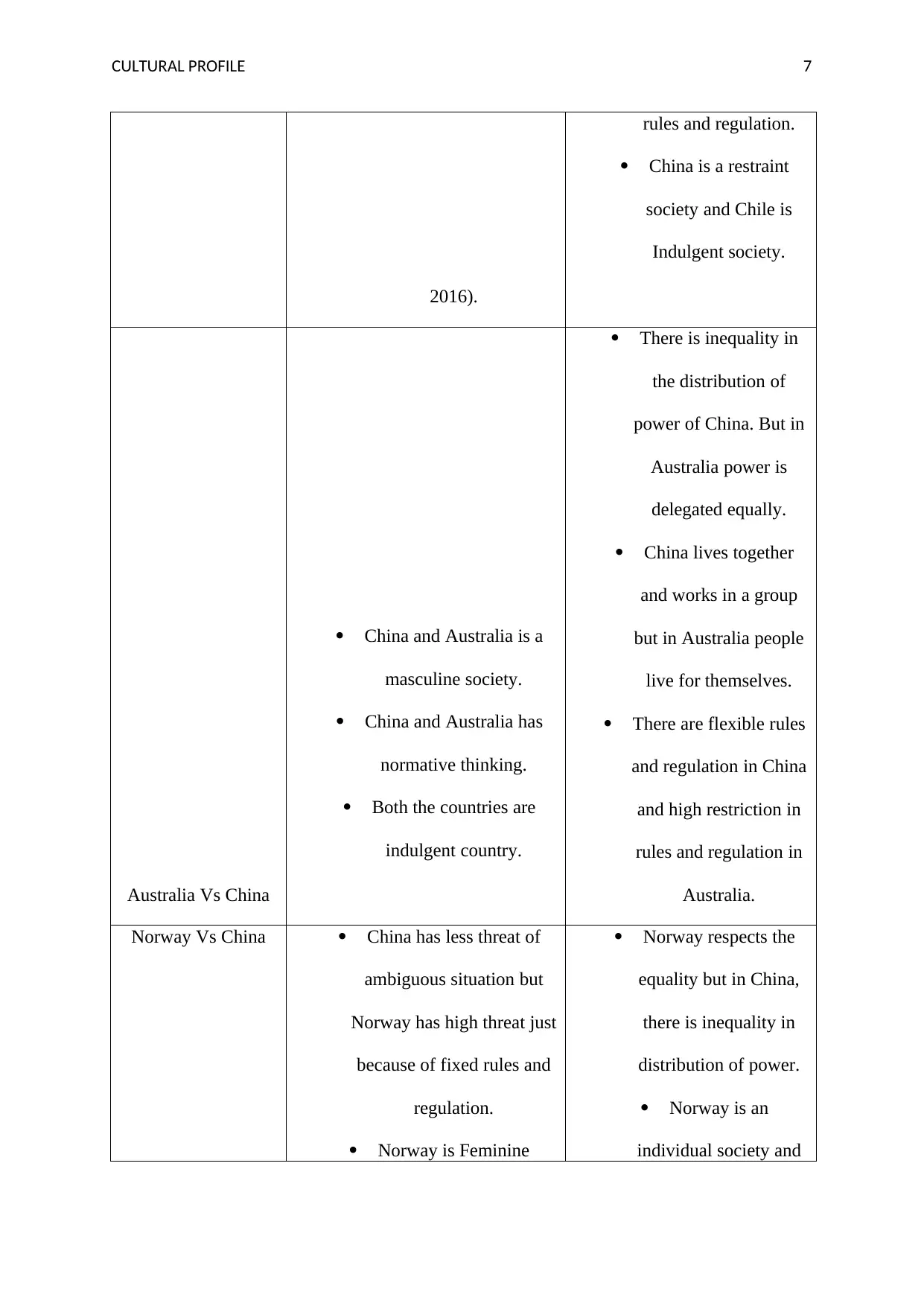
CULTURAL PROFILE 7
2016).
rules and regulation.
China is a restraint
society and Chile is
Indulgent society.
Australia Vs China
China and Australia is a
masculine society.
China and Australia has
normative thinking.
Both the countries are
indulgent country.
There is inequality in
the distribution of
power of China. But in
Australia power is
delegated equally.
China lives together
and works in a group
but in Australia people
live for themselves.
There are flexible rules
and regulation in China
and high restriction in
rules and regulation in
Australia.
Norway Vs China China has less threat of
ambiguous situation but
Norway has high threat just
because of fixed rules and
regulation.
Norway is Feminine
Norway respects the
equality but in China,
there is inequality in
distribution of power.
Norway is an
individual society and
2016).
rules and regulation.
China is a restraint
society and Chile is
Indulgent society.
Australia Vs China
China and Australia is a
masculine society.
China and Australia has
normative thinking.
Both the countries are
indulgent country.
There is inequality in
the distribution of
power of China. But in
Australia power is
delegated equally.
China lives together
and works in a group
but in Australia people
live for themselves.
There are flexible rules
and regulation in China
and high restriction in
rules and regulation in
Australia.
Norway Vs China China has less threat of
ambiguous situation but
Norway has high threat just
because of fixed rules and
regulation.
Norway is Feminine
Norway respects the
equality but in China,
there is inequality in
distribution of power.
Norway is an
individual society and
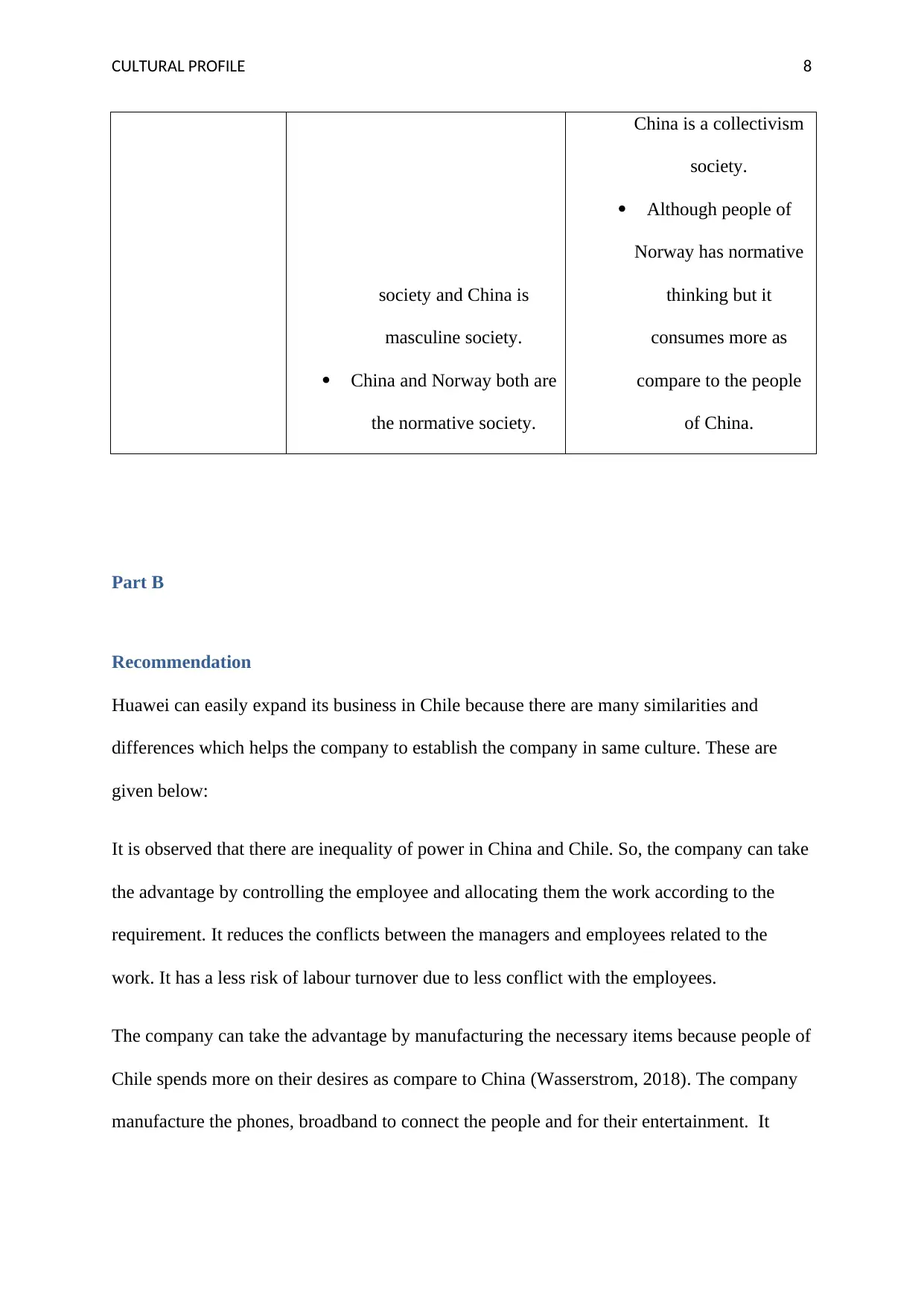
CULTURAL PROFILE 8
society and China is
masculine society.
China and Norway both are
the normative society.
China is a collectivism
society.
Although people of
Norway has normative
thinking but it
consumes more as
compare to the people
of China.
Part B
Recommendation
Huawei can easily expand its business in Chile because there are many similarities and
differences which helps the company to establish the company in same culture. These are
given below:
It is observed that there are inequality of power in China and Chile. So, the company can take
the advantage by controlling the employee and allocating them the work according to the
requirement. It reduces the conflicts between the managers and employees related to the
work. It has a less risk of labour turnover due to less conflict with the employees.
The company can take the advantage by manufacturing the necessary items because people of
Chile spends more on their desires as compare to China (Wasserstrom, 2018). The company
manufacture the phones, broadband to connect the people and for their entertainment. It
society and China is
masculine society.
China and Norway both are
the normative society.
China is a collectivism
society.
Although people of
Norway has normative
thinking but it
consumes more as
compare to the people
of China.
Part B
Recommendation
Huawei can easily expand its business in Chile because there are many similarities and
differences which helps the company to establish the company in same culture. These are
given below:
It is observed that there are inequality of power in China and Chile. So, the company can take
the advantage by controlling the employee and allocating them the work according to the
requirement. It reduces the conflicts between the managers and employees related to the
work. It has a less risk of labour turnover due to less conflict with the employees.
The company can take the advantage by manufacturing the necessary items because people of
Chile spends more on their desires as compare to China (Wasserstrom, 2018). The company
manufacture the phones, broadband to connect the people and for their entertainment. It
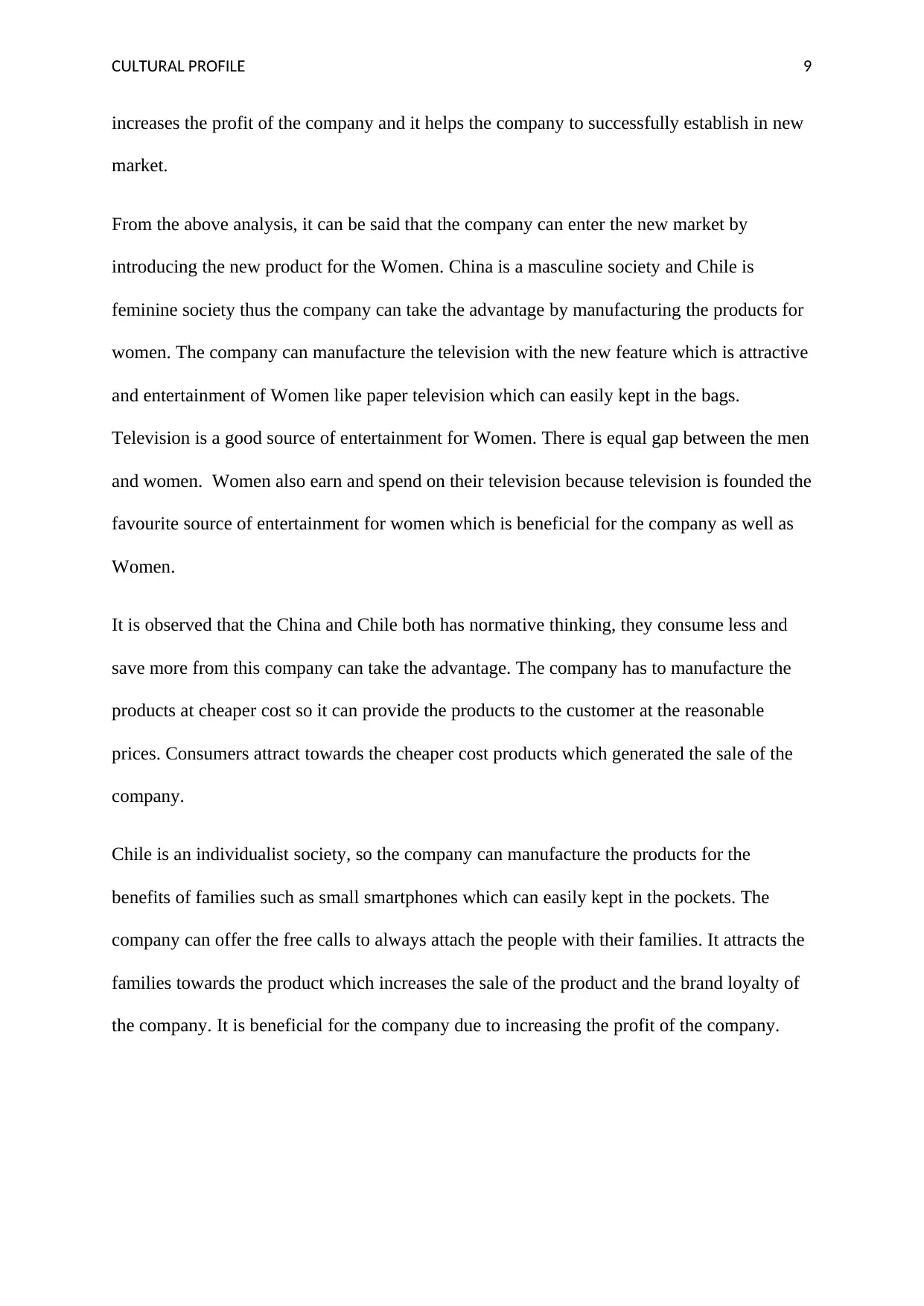
CULTURAL PROFILE 9
increases the profit of the company and it helps the company to successfully establish in new
market.
From the above analysis, it can be said that the company can enter the new market by
introducing the new product for the Women. China is a masculine society and Chile is
feminine society thus the company can take the advantage by manufacturing the products for
women. The company can manufacture the television with the new feature which is attractive
and entertainment of Women like paper television which can easily kept in the bags.
Television is a good source of entertainment for Women. There is equal gap between the men
and women. Women also earn and spend on their television because television is founded the
favourite source of entertainment for women which is beneficial for the company as well as
Women.
It is observed that the China and Chile both has normative thinking, they consume less and
save more from this company can take the advantage. The company has to manufacture the
products at cheaper cost so it can provide the products to the customer at the reasonable
prices. Consumers attract towards the cheaper cost products which generated the sale of the
company.
Chile is an individualist society, so the company can manufacture the products for the
benefits of families such as small smartphones which can easily kept in the pockets. The
company can offer the free calls to always attach the people with their families. It attracts the
families towards the product which increases the sale of the product and the brand loyalty of
the company. It is beneficial for the company due to increasing the profit of the company.
increases the profit of the company and it helps the company to successfully establish in new
market.
From the above analysis, it can be said that the company can enter the new market by
introducing the new product for the Women. China is a masculine society and Chile is
feminine society thus the company can take the advantage by manufacturing the products for
women. The company can manufacture the television with the new feature which is attractive
and entertainment of Women like paper television which can easily kept in the bags.
Television is a good source of entertainment for Women. There is equal gap between the men
and women. Women also earn and spend on their television because television is founded the
favourite source of entertainment for women which is beneficial for the company as well as
Women.
It is observed that the China and Chile both has normative thinking, they consume less and
save more from this company can take the advantage. The company has to manufacture the
products at cheaper cost so it can provide the products to the customer at the reasonable
prices. Consumers attract towards the cheaper cost products which generated the sale of the
company.
Chile is an individualist society, so the company can manufacture the products for the
benefits of families such as small smartphones which can easily kept in the pockets. The
company can offer the free calls to always attach the people with their families. It attracts the
families towards the product which increases the sale of the product and the brand loyalty of
the company. It is beneficial for the company due to increasing the profit of the company.
Secure Best Marks with AI Grader
Need help grading? Try our AI Grader for instant feedback on your assignments.
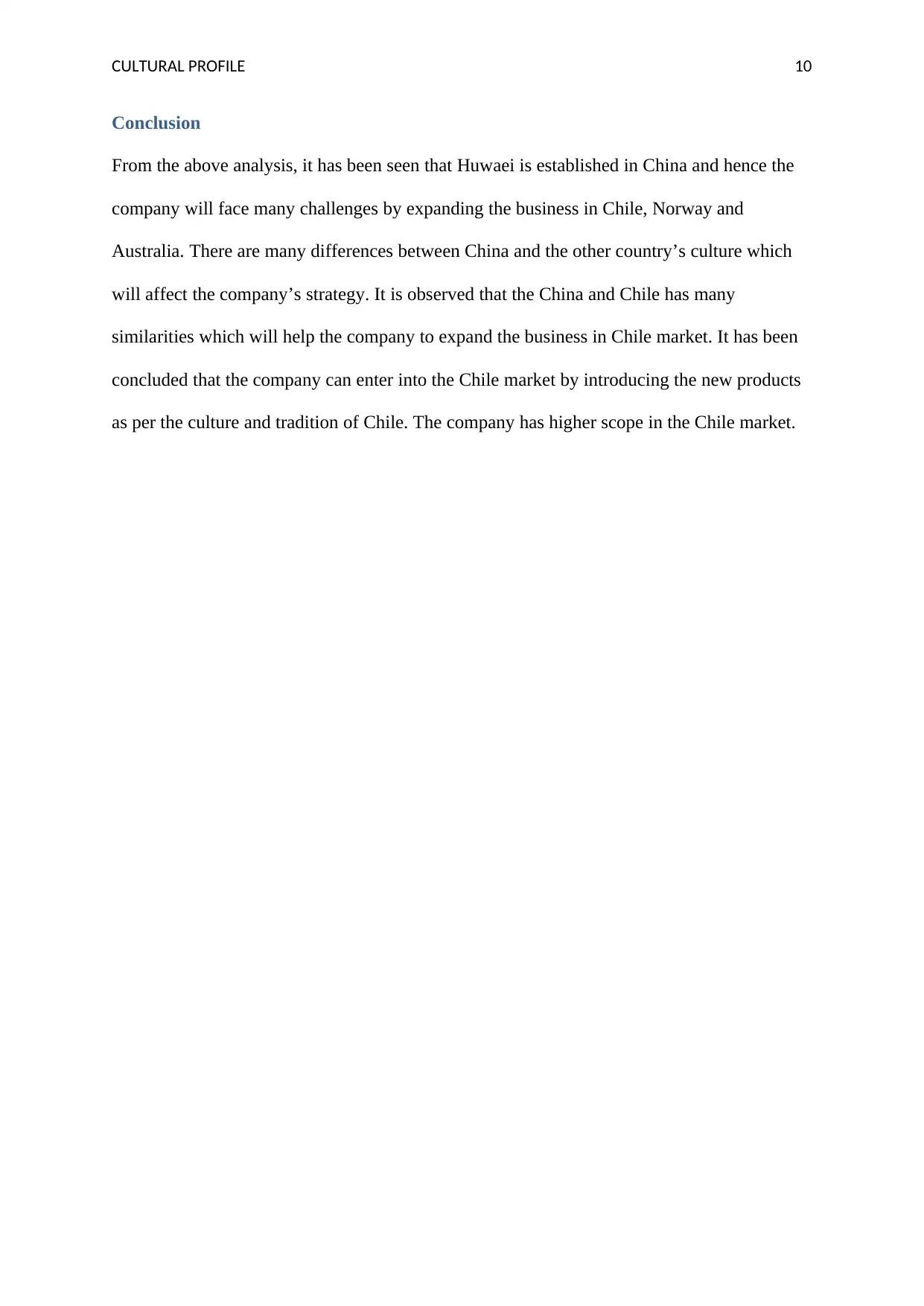
CULTURAL PROFILE 10
Conclusion
From the above analysis, it has been seen that Huwaei is established in China and hence the
company will face many challenges by expanding the business in Chile, Norway and
Australia. There are many differences between China and the other country’s culture which
will affect the company’s strategy. It is observed that the China and Chile has many
similarities which will help the company to expand the business in Chile market. It has been
concluded that the company can enter into the Chile market by introducing the new products
as per the culture and tradition of Chile. The company has higher scope in the Chile market.
Conclusion
From the above analysis, it has been seen that Huwaei is established in China and hence the
company will face many challenges by expanding the business in Chile, Norway and
Australia. There are many differences between China and the other country’s culture which
will affect the company’s strategy. It is observed that the China and Chile has many
similarities which will help the company to expand the business in Chile market. It has been
concluded that the company can enter into the Chile market by introducing the new products
as per the culture and tradition of Chile. The company has higher scope in the Chile market.
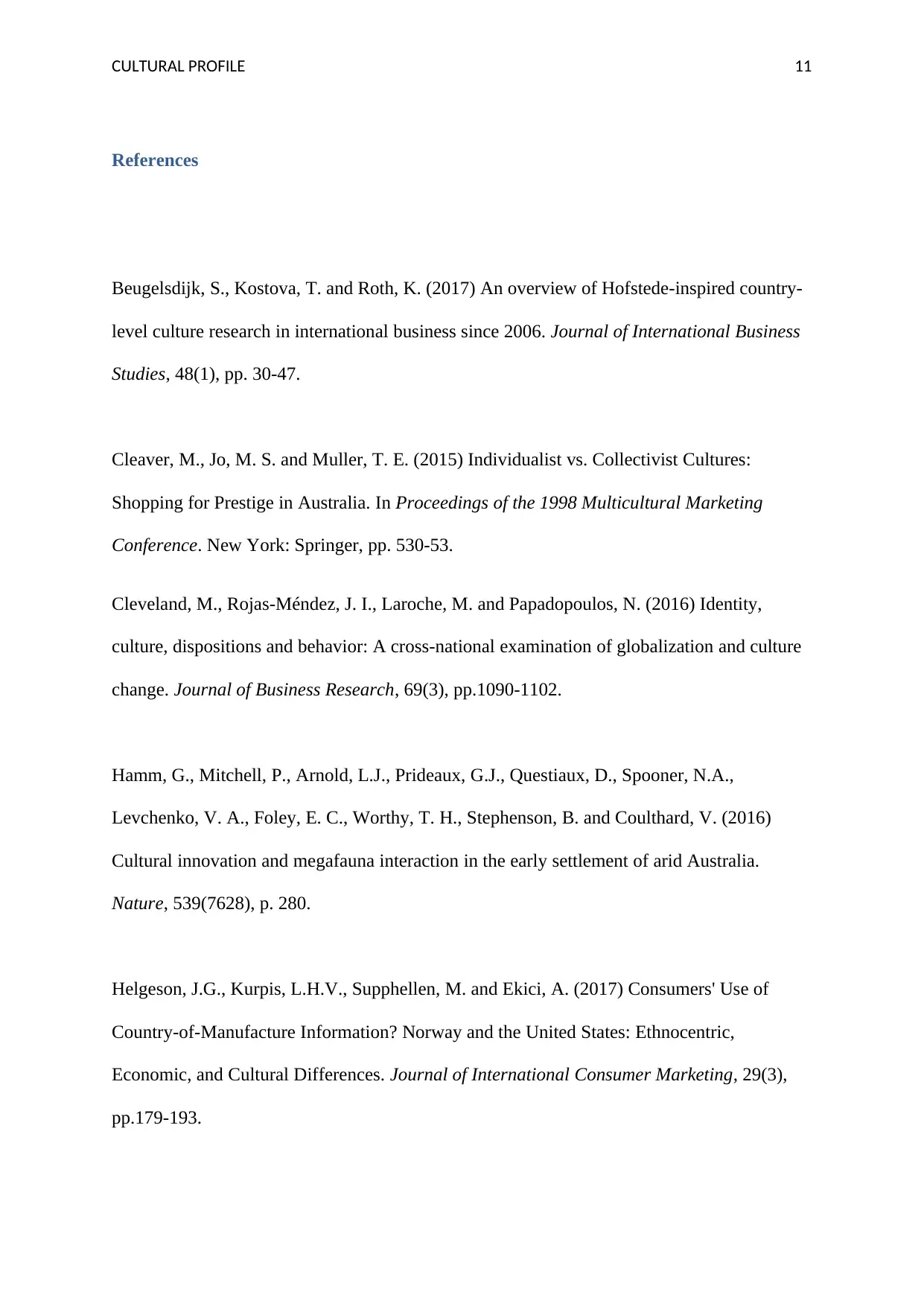
CULTURAL PROFILE 11
References
Beugelsdijk, S., Kostova, T. and Roth, K. (2017) An overview of Hofstede-inspired country-
level culture research in international business since 2006. Journal of International Business
Studies, 48(1), pp. 30-47.
Cleaver, M., Jo, M. S. and Muller, T. E. (2015) Individualist vs. Collectivist Cultures:
Shopping for Prestige in Australia. In Proceedings of the 1998 Multicultural Marketing
Conference. New York: Springer, pp. 530-53.
Cleveland, M., Rojas-Méndez, J. I., Laroche, M. and Papadopoulos, N. (2016) Identity,
culture, dispositions and behavior: A cross-national examination of globalization and culture
change. Journal of Business Research, 69(3), pp.1090-1102.
Hamm, G., Mitchell, P., Arnold, L.J., Prideaux, G.J., Questiaux, D., Spooner, N.A.,
Levchenko, V. A., Foley, E. C., Worthy, T. H., Stephenson, B. and Coulthard, V. (2016)
Cultural innovation and megafauna interaction in the early settlement of arid Australia.
Nature, 539(7628), p. 280.
Helgeson, J.G., Kurpis, L.H.V., Supphellen, M. and Ekici, A. (2017) Consumers' Use of
Country-of-Manufacture Information? Norway and the United States: Ethnocentric,
Economic, and Cultural Differences. Journal of International Consumer Marketing, 29(3),
pp.179-193.
References
Beugelsdijk, S., Kostova, T. and Roth, K. (2017) An overview of Hofstede-inspired country-
level culture research in international business since 2006. Journal of International Business
Studies, 48(1), pp. 30-47.
Cleaver, M., Jo, M. S. and Muller, T. E. (2015) Individualist vs. Collectivist Cultures:
Shopping for Prestige in Australia. In Proceedings of the 1998 Multicultural Marketing
Conference. New York: Springer, pp. 530-53.
Cleveland, M., Rojas-Méndez, J. I., Laroche, M. and Papadopoulos, N. (2016) Identity,
culture, dispositions and behavior: A cross-national examination of globalization and culture
change. Journal of Business Research, 69(3), pp.1090-1102.
Hamm, G., Mitchell, P., Arnold, L.J., Prideaux, G.J., Questiaux, D., Spooner, N.A.,
Levchenko, V. A., Foley, E. C., Worthy, T. H., Stephenson, B. and Coulthard, V. (2016)
Cultural innovation and megafauna interaction in the early settlement of arid Australia.
Nature, 539(7628), p. 280.
Helgeson, J.G., Kurpis, L.H.V., Supphellen, M. and Ekici, A. (2017) Consumers' Use of
Country-of-Manufacture Information? Norway and the United States: Ethnocentric,
Economic, and Cultural Differences. Journal of International Consumer Marketing, 29(3),
pp.179-193.
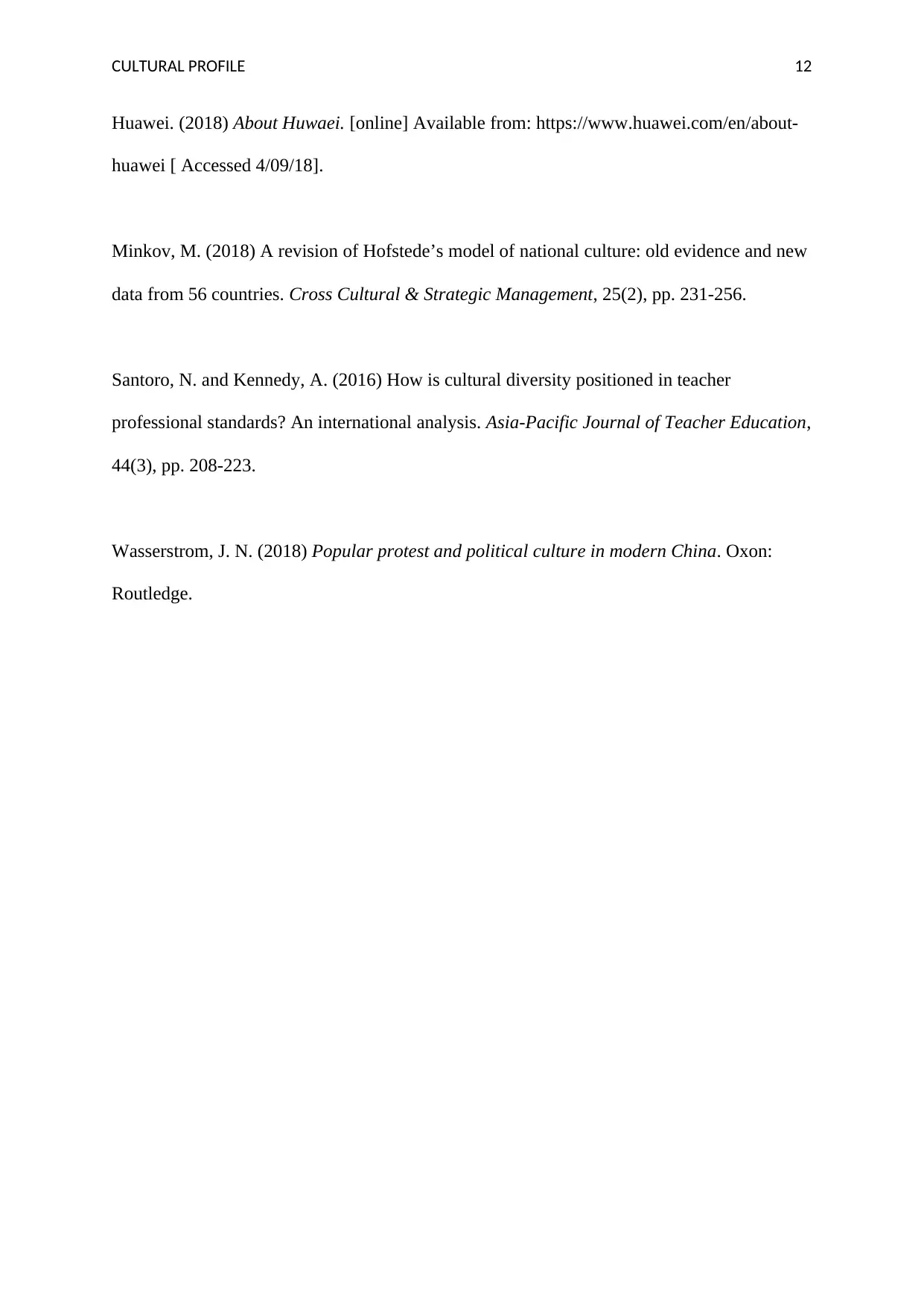
CULTURAL PROFILE 12
Huawei. (2018) About Huwaei. [online] Available from: https://www.huawei.com/en/about-
huawei [ Accessed 4/09/18].
Minkov, M. (2018) A revision of Hofstede’s model of national culture: old evidence and new
data from 56 countries. Cross Cultural & Strategic Management, 25(2), pp. 231-256.
Santoro, N. and Kennedy, A. (2016) How is cultural diversity positioned in teacher
professional standards? An international analysis. Asia-Pacific Journal of Teacher Education,
44(3), pp. 208-223.
Wasserstrom, J. N. (2018) Popular protest and political culture in modern China. Oxon:
Routledge.
Huawei. (2018) About Huwaei. [online] Available from: https://www.huawei.com/en/about-
huawei [ Accessed 4/09/18].
Minkov, M. (2018) A revision of Hofstede’s model of national culture: old evidence and new
data from 56 countries. Cross Cultural & Strategic Management, 25(2), pp. 231-256.
Santoro, N. and Kennedy, A. (2016) How is cultural diversity positioned in teacher
professional standards? An international analysis. Asia-Pacific Journal of Teacher Education,
44(3), pp. 208-223.
Wasserstrom, J. N. (2018) Popular protest and political culture in modern China. Oxon:
Routledge.
1 out of 13
Related Documents
Your All-in-One AI-Powered Toolkit for Academic Success.
+13062052269
info@desklib.com
Available 24*7 on WhatsApp / Email
![[object Object]](/_next/static/media/star-bottom.7253800d.svg)
Unlock your academic potential
© 2024 | Zucol Services PVT LTD | All rights reserved.




